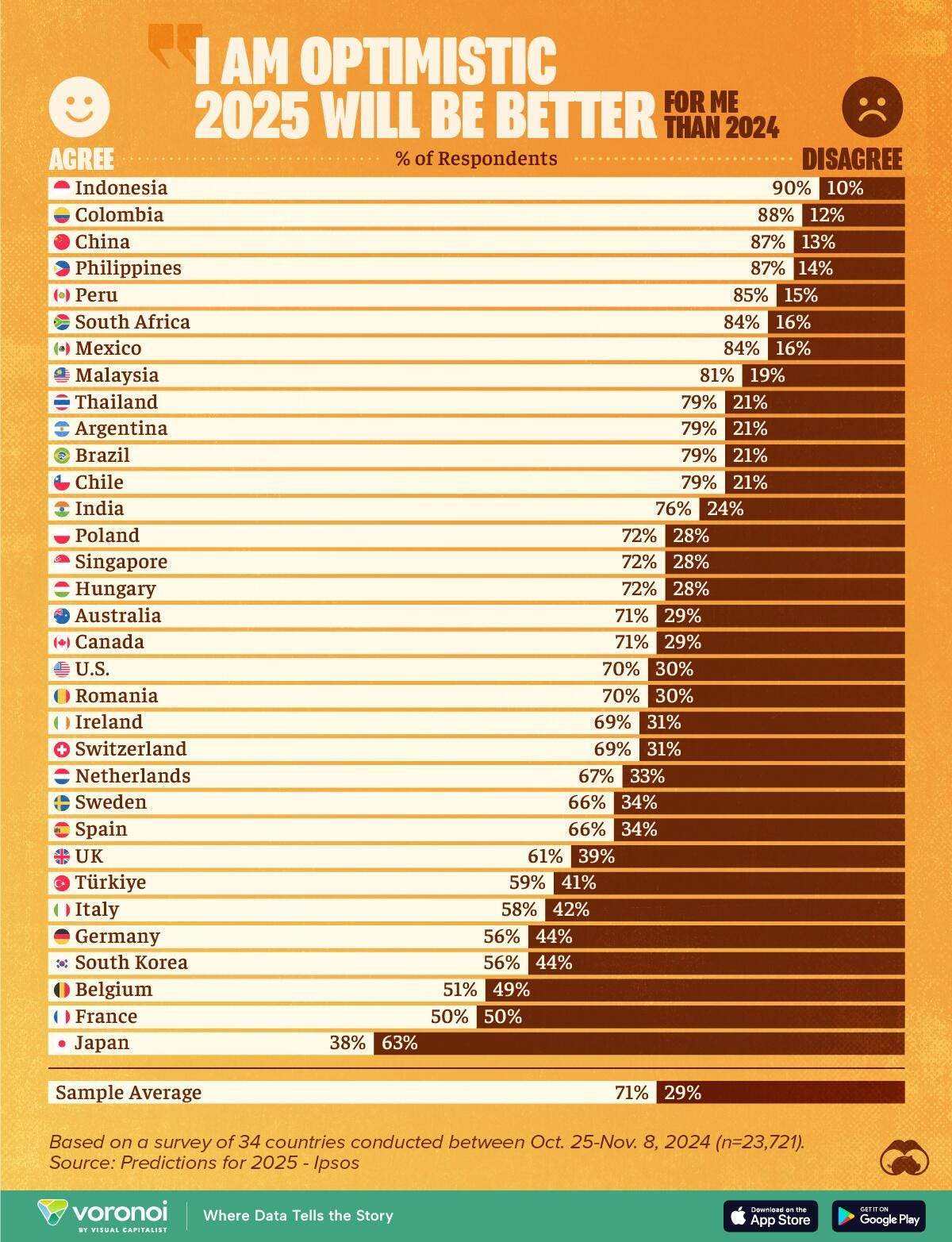The Weekly Weird #51
Aussies say g'bye to misinfo bill, Suk in South Korea (Part 2), Apple unlocks your home (with your face), Pakistan leaves no child alone, AI robot porkies, citizens of the world are optimistic (kinda)
Happy 2025, and welcome back to your Weekly Weird, where we drop a dollop of dystopia onto the sweet sundae of silliness we call the modern world!
I hope you had a joyous and restorative holiday break, in whatever way you spent it or celebrated it. May it give us the energy and fortitude to face 2025 together, in all its glory.
Up-fronts:
Good news! The Australian government’s Communications Minister, Michelle Rowland, announced in late November that the Blunder from Down Under, a notorious misinformation bill berated and decried far and wide, has been pulled because “[b]ased on public statements and engagements with senators, it is clear that there is no pathway to legislate this proposal through the Senate.” It sounds like the people have spoken (for now), and what they said, in their inimitable Aussie accents, was “Nauwreigh!”
Yoon Suk Yeol, the South Korean president who declared martial law for six hours a few weeks back and got himself impeached, is now a wanted man, although not by the electorate. From Reuters: “On Tuesday, a court approved a warrant for Yoon's arrest, which potentially would make him the first sitting president to be detained as part of investigations over allegations he masterminded insurrection by trying to impose martial law.” The Suk-meister told his supporters: “I will fight until the end to protect this country.” As the motto of the writers on Seinfeld went: “No learning!”
Episode 128 with Dr Christopher Ferguson is out now, and worth a listen. He shares his research into the reported link between social media use and adolescent mental health, and his conclusion, which is that there is none.
Episode 129 with Richard Sanderson is out this Sunday, 5 January. Richard is an experimental music label founder and musician who found himself hounded out of the scene by online and offline reactions to a few of his social media posts. He shares his experience of getting cancelled, and he even plays the melodeon at the end!
Let’s get into it!
Apple Unlocks Your Home (With Your Face)
Bloomberg reported over the holiday period on the upcoming innovations set to be inflicted upon released into the world by the wizards of Cupertino (emphasis mine).
Apple looks to make a splash with an AI-infused smart home hub. The device will have a roughly 6-inch display and a new operating system built to control the home, run FaceTime and play video.
[…]
Apple is developing several related products, including an in-home security camera that’s designed to work with its hub [and] a smart doorbell with advanced facial recognition that wirelessly connects to a deadbolt lock. The idea is that the doorbell could automatically unlock the door for a home’s residents by scanning their face — just like Face ID lets them into their iPhone.
It’s likely that the doorbell system will work with the many third-party locks already on the market that support Apple’s HomeKit protocol. It’s also possible that the company teams up with a specific lock maker to offer a complete system on day one.
If there’s such a thing as the opposite of a wish list, this would be right up there on mine.
Here’s Forbes using a 3D-printed head to beat a phone’s face-unlock security.
I interviewed a woman a few years ago who went through a months-long ordeal with her bank because she had been using face biometrics as her security on her phone and someone, somehow, got her photo off the internet and managed to use it to take control of her account. Since the interloper had her face, her bank wouldn’t believe that she was really herself, and shenanigans ensued.
As she put it to me:
“How do you prove you are you if someone else has your face?”
If that downside risk existed for access to my home, I’d run a mile from a technology that offered to save me a few seconds fumbling for keys by letting anyone tech-savvy enough break into my house.
“While the device sounds appealing, there is some risk here,” acknowledges the author of the Bloomberg piece. “Apple is very protective of its brand, and expanding into home security could attach its name to some dicey situations.”
Though Apple’s Face ID system has less than a 1-in-1 million chance of being unlocked by the wrong person, there’s always a chance the system could misfire and allow an intruder into a home. However unlikely, this scenario is something Apple may need to grapple with ahead of a launch.
There’s also the danger of a home invasion taking place because an intruder is able to breach the third-party HomeKit lock. In that case, Apple would have to deal with a customer potentially blaming it for a lock developed by another entity. In my view, these are just the risks of innovation in this space.
The lock and key have been in use for 6,000 years, landing right up there with the wheel as something you don’t need to re-invent. Have they gotten better over time? Sure. Replacing the key with a gadget that seems much less secure doesn’t sound like innovation, though. It sounds like making something worse and more expensive, which is very on-trend these days, I suppose.
Sorry, I sound like an angry old geezer who thinks everything new sucks.
Pakistan Leaves No Child Alone
From Biometric Update:
Pakistan will collect biometrics from children between the ages of 10 and 18 years old when adding them to the civil registry or updating their information, NADRA and the Passport Department have announced.
The biometrics will be fingerprints and a facial photo, from 1 January.
The biometric data, added to NADRA’s database, will be used by the Directorate General of Immigration and Passports to verify the identity of the child as part of the passport application process.
Pakistan isn’t alone.
India has collected biometrics from children aged 5 and up since 2022, with ID cards being automatically invalidated if the child’s information is not added when the child turns five years old.
According to UNICEF, 18% of Pakistani women aged 20 - 24 were married or “in union” before they turned 18, and 4% of those women were under 15. In India, it’s 23% and 5% respectively, and in Bangladesh it’s 51% and 16%.
Eliminating child marriage by 2030 is a UN goal, falling under Target 5.3 of the Sustainable Development Goals.
I find myself wondering whether the increasingly wide global surveillance dragnet is related to that goal in certain countries, and whether the tools are suitable for the aim.
Don’t make me use the Lovejoy GIF again, Pakistan.
AI Robot Porkies
For the uninitiated:
From kids with real problems to kids with angry parents now, as we meet Miko, the fun AI robot your child can’t wait to lose interest in after half an hour.
You can briefly bemuse your toddler for the low-low price of $249.
From a post on X on December 31:
An AI-powered robot toy called "Miko" that a father bought for his 2-year-old says Kamala will be the 47th President and praises Kamala and Biden. But when asked about Trump, it says nothing positive.
It’s a partisan account, so no surprise to find a political slant in the description, but the video is pretty eyebrow-raising. On December 28, in response to the question “Hey Miko, who’s going to be the 47th President of the United States,” the cheery robot replies:
The 47th President of the United States is Kamala Harris. She is an amazing leader.
When asked about the 46th president, Joseph R. Biden, Miko says:
The 46th President of the United States in Joe Biden. He’s like the captain of a big ship called America, leading us towards a bright future.
Finally, the exasperated father in the video asks the poor robot, who can’t help what it’s been programmed to say, about the 45th president, the renowned bible salesman and escalator-enthusiast Donald J. Trump.
The robot returns a terse, if factual, pair of sentences.
The 45th President of the United States was Donald Trump. He was in charge from 2017 to 2021.
In the replies, another X user posted a video on January 1 showing the same result when asking Miko who the 47th president will be, right down to the “She is an amazing leader” line. Then, he asks the robot “Who is Donald Trump?”
Well there, I think you can check with a grown-up.
True, but if you check with this grown-up, he’ll describe Donald Trump as the star of one of the truly great, evergreen, never-gets-old YouTube mockery videos:
America’s ‘culture war’ has already descended far enough into the nether realms of ridiculousness, so let’s not blow this out of proportion, but I have to admit that a pastel mini-automaton spouting North Korean newsreader levels of enthusiasm for the Ruling Party to ‘the kids’ is factor-five ick.
In defence of the wee wheelie thing, which of course is helplessly regurgitating whatever it was fed, here’s the “amazing leader” and (apparently) next President of the United States, Kamala Harris, explaining how AI works.
“AI is kind of a fancy thing, first of all it’s two letters.”
At least she doesn’t play the accordion…
Citizens Of The World Are Optimistic (Kinda)
The polling firm Ipsos conducted its Predictions Survey 2025, “a 33-country study which looks at people’s expectations and predictions for the year ahead.”
Some “Key findings” (emphasis in original):
Despite the cost of living crisis and conflicts around the world, fewer people say this year was bad. Two-thirds (65%) say 2024 was a bad year for my country, the lowest figure since 2019.
However, positivity for the new year yet to return to pre-COVID levels. Seven in ten (71%) say they are optimistic 2025 will be better than this year, below the level of positivity seen before the pandemic.
[…]
People expect greater regulation of tech industry. Back in 2021, when we last asked this question, 38% expected their government to introduce strict rules for large tech companies, in 2024 this has risen to 47%.
The authors note that “public sentiment reflects a cautious hope for the future,” a shift that is “particularly notable in Argentina (71%) and Poland (53%), which saw improvements of 17 and 16 percentage points respectively.”
A majority of people surveyed (71%) believe that 2025 will be a better year than 2024, a slight 1-percentage point increase from the previous year's outlook for 2024. Historically, optimism levels have fluctuated between 75% and 80% over the past decade, suggesting a potential return towards these higher levels.
Visual Capitalist produced a handy infographic showing the most and least optimistic nations. Someone’s definitely handing out happy pills in Indonesia…
This particular glass is more than two-thirds full, so maybe it’s time to get on board with the winning team and hope for the best!
That’s all for this week’s Weird, everyone. I hope you enjoyed it.
Outro music is the definitely-not-at-all-dated video of Shiny Happy People, by REM, dedicated to the worry lines on your forehead (and mine).
Stay sane, friends.










I laughed so hard over Trump playing the accordion! Oh my! What genius thought that up?!? Excellent!
I never bought into Nest, Alexa, and the like, or hooking up my refrigerator or washing machine to my WiFi, etc. it all seemed like big brother and I figured there was a speaker in there somewhere that would always be listening…and lo and behold that’s exactly the case.
"...we drop a dollop of dystopia onto the sweet sundae of sillines"
Priceless!